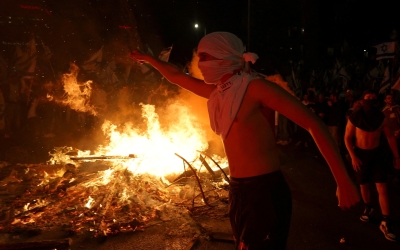US and Germany 'concerned' following mass Israeli protests against judiciary overhaul

The United States and Germany have expressed "concern" over recent widespread protests and strikes that have brought Israel to a standstill in objection to a controversial judicial overhaul.
On Sunday evening, hundreds of thousands of Israelis staged mass protests up and down the country after Prime Minister Benjamin Netanyahu fired the Defence Minister Yoav Gallant.
Gallant had warned Netanyahu of causing damage to national security if he pressed ahead with judicial overhaul, which infuriated army reservists who vowed not to call for service if the changes in law went ahead.
On Monday, universities shut down, and airport workers and big companies stopped working to protest the overhaul, which they see as harming democracy. There were also further mass strikes and protests across the country.
New MEE newsletter: Jerusalem Dispatch
Sign up to get the latest insights and analysis on Israel-Palestine, alongside Turkey Unpacked and other MEE newsletters
The White House's National Security Council, which advises the US president on foreign policy issues, said on Monday they were deeply concerned about the events, urging a compromise.
"As the [US] President recently discussed with Prime Minister Netanyahu, democratic values have always been and must remain a hallmark of the US-Israel relationship," Adrienne Watson, the spokesperson for the council, said.
"Democratic societies are strengthened by checks and balances, and fundamental changes to a democratic system should be pursued with the broadest possible base of popular support," she said.
"We continue to strongly urge Israeli leaders to find a compromise as soon as possible."
On Monday, Germany said it is also concerned with the developments, but it "does not interfere in other countries' domestic affairs".
Israel consulted Poland
Pawel Jablonski, the Deputy Foreign Minister of Poland, said that "the Israeli government consulted with us regarding the reform of the judicial system", during a local radio interview on Monday.
According to Kan broadcast, Jablonski was asked: "So your influence on Israel is such that everyone in the street is protesting against the reform in the judicial system, and claiming that it harms the rule of law?"
The deputy minister replied: "Well, this is an internal matter for Israel, however when we talked with the Israeli government, we shared our experience with it, and the government itself also asked us."
Poland carried out a judicial overhaul between 2016 and 2018, which put the independence of courts at risk of political control and passed a law in 2017 mandating retirement for all judges aged over 65, giving the ministry of justice tighter grip over the judges' livelihoods.
Poland's governing party had appointed the majority of judges to the Constitutional Tribunal, which can veto legislation and had dominated the committee which appoints judges, furthering government control.
Netanyahu's coalition is planning a similar law overhaul, which would void the Supreme Court of any power over government legislation by dominating the judges' appointing committee and allowing the Knesset to reject Supreme Court decisions with a slim majority vote.
Western capitals 'concerned'
The judicial overhaul in Israel was received with concern in a number of western capitals.
On Friday, the office of British Prime Minister Rishi Sunak "stressed the importance of upholding the democratic values that underpin our relationship, including in the proposed judicial reforms in Israel".
Netanyahu visited London last Friday, and was met with protests by Israeli citizens and British Jews outside 10 Downing Street.
Olaf Scholz, the German Chancellor, also criticised the Israeli government in a rare statement, saying during a joint conference with Netanyahu in Berlin last week, "as democratic value partners and close friends of Israel, we are following this debate very closely and I will not hide this, with great concern,” Scholz said.
“The independence of the judiciary is a high democratic good," he added.
Middle East Eye delivers independent and unrivalled coverage and analysis of the Middle East, North Africa and beyond. To learn more about republishing this content and the associated fees, please fill out this form. More about MEE can be found here.





